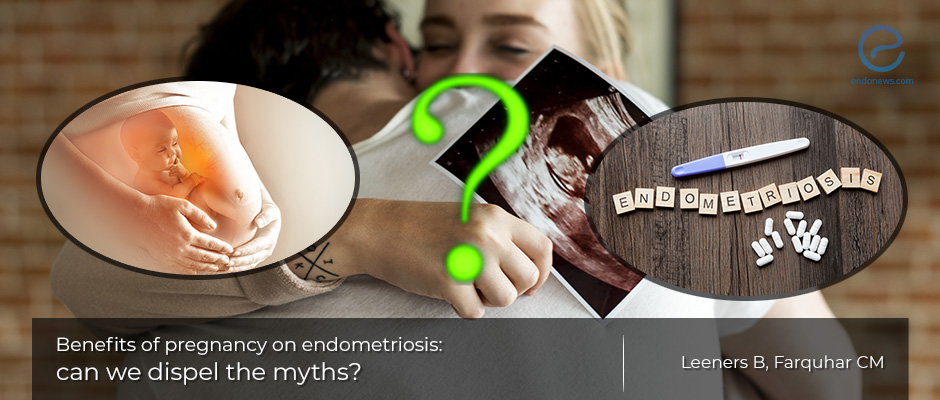How does pregnancy affect endometriosis?
Sep 25, 2019
While pregnancy prevents the formation of new endometriotic lesions, its effect on existing lesions and associated symptoms has not been clearly understood.
Key Points
Highlights:
- It is known that pregnancy improves dysmenorrhea in endometriosis patients due to the suppression of menstruation and reduces the risk of new lesion formation.
- However, is it not clear whether it should not be recommended as a therapeutic option for endometriosis patients since long-term effects after pregnancy have not been elucidated.
Importance:
- Pregnancy should not be recommended as a treatment alternative to endometriosis patients without answering all questions including the relationship between endometriosis and pregnancy.
What’s done here?
- This article summarizes all aspects of how endometriosis is affected by pregnancy regarding the new lesion formation, regression of existing lesions, and the symptoms such as pain, dysmenorrhea.
- The authors evaluated 5 studies involving 141 women and several case reports as well as case series available on the subject.
- In addition to the beneficial effects of pregnancy on endometriosis, the undesirable consequences of pregnancy are also explained.
- The pathophysiologic mechanisms leading to these effects of pregnancy on endometriosis are discussed, along with the recommendations.
Key results:
- Based on the included studies, it is reported that 15% to 50% of endometriotic lesions disappeared, 34% to 65% regressed, and the remaining either increased (9% to 39%) or unchanged (25%) during pregnancy.
- This effect has been explained by the suppression of menstruation, as endometriosis is rare before menarche or after menopause. Increased progesterone levels cause endometrial atrophy and regression of endometriosis. Therefore, progesterone therapy forming pseudopregnancy is used as a therapeutic option in the management of endometriosis.
- The main effect of pregnancy on endometriosis is to prevent the formation of new endometriotic lesions and associated symptoms. However, the routine follow-up of the existing endometriotic lesions that are especially asymptomatic by ultrasonography during pregnancy is not possible.
- Although pregnancy is recommended as a treatment option for patients with endometriosis, complications of endometriosis may develop during pregnancy such as rupture of endometriomas, intestinal perforation, spontaneous hemoperitoneum due to ruptured blood vessels, and infection of endometriotic lesions due to the decidualization.
- Poor obstetric outcomes including miscarriage, preterm birth have also been associated with endometriosis.
Lay Summary
Endometriosis is the localization of endometrial stromal and glandular cells outside the uterine cavity. Pregnancy is offered as a treatment option for patients with endometriosis because it causes atrophy of endometrial cells similar to progesterone treatment.
Progesterone predominance during pregnancy, as observed before menarche or after menopause, generally leads to regression of endometriosis-associated symptoms due to the development of amenorrhea. Although there is not much evidence about the fate of endometriotic lesions and related symptoms after pregnancy, pregnancy is recommended to patients with endometriosis because of its beneficial effect.
Leeners and Farquhar, a group of scientists from Switzerland and New Zealand, published a study titled as “Benefits of pregnancy on endometriosis: can we dispel the myths?” in the journal named Fertility and Sterility.
Although there are heterogeneous publications in the literature, these authors included 5 studies involving 141 women and several case reports or case series which were available on the subject and summarized their results. The publications are heterogeneous due to the different time periods and techniques of investigation (clinical, ultrasound, magnetic resonance imaging, surgery, histology), types of lesions investigated (ovarian, non-ovarian, specific locations), information on lesions collected (size, number, structure), other parameters, and analytical approaches.
Despite several limitations of existing studies, it seems that the risk for the formation of new endometriotic lesions decreases during pregnancy. However, it appears that the follow-up of asymptomatic endometriotic lesions is not possible.
The authors also mentioned the complications of endometriosis during pregnancy such as rupture of endometriomas, intestinal perforation, spontaneous hemoperitoneum due to ruptured blood vessels, and infection of endometriotic lesions. Decidualization during pregnancy has been suggested as the cause of these unwanted consequences.
“Pregnancy should not be suggested to women with endometriosis as a strategy for managing symptoms and reducing the progression of endometriosis. The decision to have children should not be influenced by any perceived benefit of improving endometriosis but should be made solely on the wish for parenthood,” they added.
Research Source: https://www.ncbi.nlm.nih.gov/pubmed/31280954
endometriosis pregnancy amenorrhea dysmenorrhea recurrence endometriosis associated symptoms

